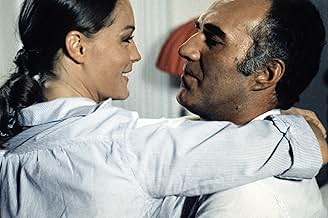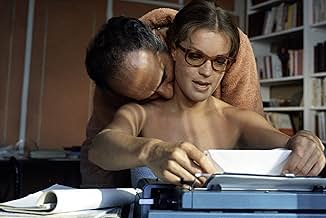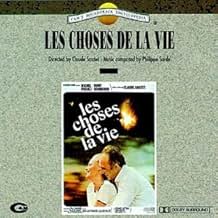A highway engineer is involved in a car crash, after which, near death, he remembers his life leading up to the accident.A highway engineer is involved in a car crash, after which, near death, he remembers his life leading up to the accident.A highway engineer is involved in a car crash, after which, near death, he remembers his life leading up to the accident.
- Awards
- 1 win & 2 nominations total
Featured reviews
"Les choses de la vie" is the ultimate "mid life crises" movie. A middle aged man must (but can not) choose between his younger girl friend on the one hand and his ex wife and son on the other hand. As a result he gets irritated and frustrated. He smokes heavily and drives aggressively.
Michel Piccoli wonderfully impersonates this character (Pierre Berard). It was a good choice of television channel "Arte" to select this film in memory of Michel Piccoli, who died in may 2020 at the age of 94.
"Les choses de la vie" also was the film in which director Claude Sautet changed from "crime" to "drama", and especially the drama of the middle class. He so became a sort of French Ozu. But where the middle aged Japanese man above all is interested in the marriages of his daughters (or the lack thereoff), the European middle aged man tries to prove that he is still capable by taking a younger mistress.
Sautet tells the story in a peculiar chronological order. Center piece in the movie is a car accident with Pierre as its victim (after all he was driving aggressively). Just like a stone thrown in the water gives wrinklings moving in ever wider circles, the injured Pierre has memories that go further and further back in time. At the end there is no clear distinction anymore between memories and dreams.
Michel Piccoli wonderfully impersonates this character (Pierre Berard). It was a good choice of television channel "Arte" to select this film in memory of Michel Piccoli, who died in may 2020 at the age of 94.
"Les choses de la vie" also was the film in which director Claude Sautet changed from "crime" to "drama", and especially the drama of the middle class. He so became a sort of French Ozu. But where the middle aged Japanese man above all is interested in the marriages of his daughters (or the lack thereoff), the European middle aged man tries to prove that he is still capable by taking a younger mistress.
Sautet tells the story in a peculiar chronological order. Center piece in the movie is a car accident with Pierre as its victim (after all he was driving aggressively). Just like a stone thrown in the water gives wrinklings moving in ever wider circles, the injured Pierre has memories that go further and further back in time. At the end there is no clear distinction anymore between memories and dreams.
With "les choses de la vie" ,Claude Sautet relinquished his former style ,film noir ("classes tous risques" "l'arme à gauche" both worth seeking)in favor of bourgeois psychological dramas .
"Les choses de la vie" was the first link on the chain,and -with the exception of "Max et les ferrailleurs" (1971),which showed Sautet at the height of his powers,when he came back for a short while to his first inspiration-remains the best of this "cinema de qualité".
Unlike the other works ("Mado" "Cesar et Rosalie" "Vincent,François,Paul et les autres" "une histoire simple" ,etc etc etc) ,"les choses de la vie" has an emotional power and an unusual inventive direction.Editing is stunning (the first picture is one wheel of the car ),and never a car accident was filmed with such mastery.Flashbacks are used with great skill too.The nightmare scene (the wedding) remains very impressive today.And the metaphorical way Sautet uses to depict the hero's death commands respect and admiration.The last part of the movie is almost completely silent,but the strength of the pictures and the actors' talent (Piccoli,Schneider,but Lea Massari and Jean Bouise too)work wonders.Superb score.louis Delluc prize.
Remake :"intersection" featuring Richard Gere.As I cannot say something nice...
"Les choses de la vie" was the first link on the chain,and -with the exception of "Max et les ferrailleurs" (1971),which showed Sautet at the height of his powers,when he came back for a short while to his first inspiration-remains the best of this "cinema de qualité".
Unlike the other works ("Mado" "Cesar et Rosalie" "Vincent,François,Paul et les autres" "une histoire simple" ,etc etc etc) ,"les choses de la vie" has an emotional power and an unusual inventive direction.Editing is stunning (the first picture is one wheel of the car ),and never a car accident was filmed with such mastery.Flashbacks are used with great skill too.The nightmare scene (the wedding) remains very impressive today.And the metaphorical way Sautet uses to depict the hero's death commands respect and admiration.The last part of the movie is almost completely silent,but the strength of the pictures and the actors' talent (Piccoli,Schneider,but Lea Massari and Jean Bouise too)work wonders.Superb score.louis Delluc prize.
Remake :"intersection" featuring Richard Gere.As I cannot say something nice...
I loved the novel . And I was seduced by the film. Because it represents more than a good adaptation.
First, it is a beautiful new demonstration of the art of Claude Sautet to explore facts behind the silence veil, from the complexity of relation to the vulnerabilities and certitudes, the basic traits of bourgeous life and the spirit of family, the loneliness and the game of apparences.
Second, for the great acting .
Not the last, for the powerful scenes, the most intense remaining the wedding and the ship ignoring him. Romy Schneider is just admirable in each scene, few of them reminding The assasination of Trotsky.
More than a good adaptation, it is a poem about essence of life, about regrets, decissions and force / meanings of love. And , sure, about the cold plus tard.
One of the most impressive virtues, the scenes of accident , splendid because, reading, years ago, the novel, I believed than that scenes are impossible to be proposed by a film . But, I ignored the gifts of a Claude Sautet.
First, it is a beautiful new demonstration of the art of Claude Sautet to explore facts behind the silence veil, from the complexity of relation to the vulnerabilities and certitudes, the basic traits of bourgeous life and the spirit of family, the loneliness and the game of apparences.
Second, for the great acting .
Not the last, for the powerful scenes, the most intense remaining the wedding and the ship ignoring him. Romy Schneider is just admirable in each scene, few of them reminding The assasination of Trotsky.
More than a good adaptation, it is a poem about essence of life, about regrets, decissions and force / meanings of love. And , sure, about the cold plus tard.
One of the most impressive virtues, the scenes of accident , splendid because, reading, years ago, the novel, I believed than that scenes are impossible to be proposed by a film . But, I ignored the gifts of a Claude Sautet.
While it's hardly the only film to have ever played with a non-linear narrative, still it takes a little bit to get a grasp on the proceedings as they go back and forth, and requires active viewership. With this in mind the tack is especially useful for 'Les choses de la vie' as at its core the story is relatively simple - simple, but nonetheless engaging and enjoyable. Even setting aside the hops to and fro in time I take issue somewhat with the sequencing insofar as it initially lends to a sense that the picture is having a hard time finding the right tone; I think another imperfection also rears its head in a few instances of dialogue that are better at conveying a broad mood than specifically speaking to characters' relationships or goings-on. For any idiosyncrasies or subjective faults, however, by and large the finished product is quite good - and in fact in the latter half the same sequencing that marks some roughness in earlier scenes is essential in producing the sparks of brilliance in later ones that help to elevate the movie to another level.
Framed in no small part as recollections and flashbacks following an accident, the picture is a loose but calculated portrait of a man figuring out what he wants in life, and the drama and tragedy that upend it. As such the film relies heavily on the strength of Claude Sautet's direction, and even more so on the performances of the cast. The acting is restrained yet characterized by controlled, nuanced range and emotional depth, tact and subtlety that comes across even where voiceover is employed. Michel Piccoli, Lea Massari, and Romy Schneider are all excellent, and audiences would certainly expect no less from them; those in smaller supporting parts are just as swell, though, in breathing life into the tableau. If more significant in select bits and pieces, Jean Boffety's cinematography and even more so Jacqueline Thiédot's editing are terrific, sharp and shrewd in heightening the impact of some moments, or in the latter half being a substantial source of it as the sounds of urgency are painfully contrasted with far brighter imagery.
In all other regards 'Les choses de la vie' is wonderfully well done, including not least the sparing but exquisite original music of Philippe Sarde that lends to the poignancy of the sorry tale. The stunts, effects, and special makeup that dominate in the pivotal car crash are superb, and the feature can claim fantastic production design generally. The costume design, hair, and makeup are lovely across the board. And, yes, I think the writing is uneven in terms of the approximate second half carrying the overwhelming majority of the meaningful weight of the story, while earlier scenes are mildly insufficient to that same end. Be that as it may, more than not the screenplay proves itself over time: characters and the relationships between them are given all the definition they require to round out careful scene writing, and the meticulous construction of the narrative is just as if not more important than the beats themselves to letting its gravity ring out. The film may not be flawless, but for what it does well, it more than compensates for any perceived issues.
When all is said and done the title is more compelling and satisfying than I was ready to give it credit for at first; the value may be primarily shifted to the back end, but it's very much worth it. All the same I don't know if I'd go so far as to say that Sautet's movie is an outright must-see, unless perhaps one is a big fan of someone involved - but it still stands as a fine testament to the skills and intelligence of all on hand. Well made all around, ultimately the writing and editing actually leap out just as much as the acting and direction does from the get-go, and marginal imbalance is easily forgiven. If you have the chance to watch, 'Les choses de la vie' is a great drama that's worth checking out.
Framed in no small part as recollections and flashbacks following an accident, the picture is a loose but calculated portrait of a man figuring out what he wants in life, and the drama and tragedy that upend it. As such the film relies heavily on the strength of Claude Sautet's direction, and even more so on the performances of the cast. The acting is restrained yet characterized by controlled, nuanced range and emotional depth, tact and subtlety that comes across even where voiceover is employed. Michel Piccoli, Lea Massari, and Romy Schneider are all excellent, and audiences would certainly expect no less from them; those in smaller supporting parts are just as swell, though, in breathing life into the tableau. If more significant in select bits and pieces, Jean Boffety's cinematography and even more so Jacqueline Thiédot's editing are terrific, sharp and shrewd in heightening the impact of some moments, or in the latter half being a substantial source of it as the sounds of urgency are painfully contrasted with far brighter imagery.
In all other regards 'Les choses de la vie' is wonderfully well done, including not least the sparing but exquisite original music of Philippe Sarde that lends to the poignancy of the sorry tale. The stunts, effects, and special makeup that dominate in the pivotal car crash are superb, and the feature can claim fantastic production design generally. The costume design, hair, and makeup are lovely across the board. And, yes, I think the writing is uneven in terms of the approximate second half carrying the overwhelming majority of the meaningful weight of the story, while earlier scenes are mildly insufficient to that same end. Be that as it may, more than not the screenplay proves itself over time: characters and the relationships between them are given all the definition they require to round out careful scene writing, and the meticulous construction of the narrative is just as if not more important than the beats themselves to letting its gravity ring out. The film may not be flawless, but for what it does well, it more than compensates for any perceived issues.
When all is said and done the title is more compelling and satisfying than I was ready to give it credit for at first; the value may be primarily shifted to the back end, but it's very much worth it. All the same I don't know if I'd go so far as to say that Sautet's movie is an outright must-see, unless perhaps one is a big fan of someone involved - but it still stands as a fine testament to the skills and intelligence of all on hand. Well made all around, ultimately the writing and editing actually leap out just as much as the acting and direction does from the get-go, and marginal imbalance is easily forgiven. If you have the chance to watch, 'Les choses de la vie' is a great drama that's worth checking out.
A typical 70's drama, something that still gets its way when it comes to touch that emotional key in us (Or some of us) and makes us long for that passionate love story, without a tragic end of course. Through a filter of pastel tones, Sautet portrays the typical struggle many have put themselves through to fork onto a secondary sentimental route in life, thinking they can have it both ways. Albeit its apparent sappy tone, Les Choses de la Vie is an intense mature story of love and sacrifice, a double one at the end.
I find European dramas very attractive, perhaps because they portray a kind of no-frills passion that is very hard to come across nowadays, both in movies and in reality. A movie like this surely has its clichés, the dual life, the regrets, the tragic death but in this movie Sautet is a wizard in enfolding the viewer with a very bitter-sweet sequence of happy yet solemn flashbacks. Pedro Lazaga's Largo Retorno (1975) happens to be similar in the way the relationship between the two main characters comes to an end (The memories, the sorrow, the death), granted in Les Choses de la Vie there is a three-way story. Both Michel Piccoli and Romy Schneider fit perfectly in the above scheme of things.
Just like in Largo Retorno, a very somber yet passionate baroque score complements the entire movie, leaving us with a soggy handkerchief at the end.
I find European dramas very attractive, perhaps because they portray a kind of no-frills passion that is very hard to come across nowadays, both in movies and in reality. A movie like this surely has its clichés, the dual life, the regrets, the tragic death but in this movie Sautet is a wizard in enfolding the viewer with a very bitter-sweet sequence of happy yet solemn flashbacks. Pedro Lazaga's Largo Retorno (1975) happens to be similar in the way the relationship between the two main characters comes to an end (The memories, the sorrow, the death), granted in Les Choses de la Vie there is a three-way story. Both Michel Piccoli and Romy Schneider fit perfectly in the above scheme of things.
Just like in Largo Retorno, a very somber yet passionate baroque score complements the entire movie, leaving us with a soggy handkerchief at the end.
Did you know
- TriviaCigarette count: 46
- GoofsIn the car crash scene, the stunt double for Michel Piccoli is seen wearing brown gloves in close-ups. However Piccoli is bare-handed while driving.
- ConnectionsFeatured in Claude Sautet ou La magie invisible (2003)
- How long is The Things of Life?Powered by Alexa
Details
- Release date
- Countries of origin
- Language
- Also known as
- These Things Happen
- Filming locations
- Rue de Sèvres, Paris 7, Paris, France(Hélène shopping)
- Production companies
- See more company credits at IMDbPro
Box office
- Gross US & Canada
- $5,063
- Gross worldwide
- $5,063
- Runtime1 hour 29 minutes
- Sound mix
- Aspect ratio
- 1.66 : 1
Contribute to this page
Suggest an edit or add missing content






























